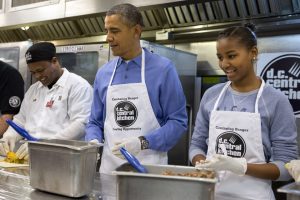Who do Programs Serve?
All the culinary careers programs interviewed focused on training disadvantaged and diverse populations. A total of 9 of the 22 programs researched worked with youth, including ‘’Opportunity Youth,’’ which describes youth between 16-24 who are not in school and not working. Another 13 of the 22 programs researched included training programs for adults with different barriers to employment. For example, the Kitchens for Good program worked with formerly incarcerated individuals, while Inspiration Kitchens program worked with people who had previously experienced homelessness. The programs targeted their training curriculum to the specific problems facing their target population. For example, the Maryland Food Bank program works in a shelter, to help feed the needy while training chefs.
Program Spotlight: DC Central Kitchen

DC Central Kitchen Culinary Job Training program teaches the foundations of the culinary theory, which includes hands-on knife skills, professional kitchen standards, professional behavior standards, and workflow.
DC Central Kitchen helps students master the personal skills necessary to build a lasting career.
DC Central Kitchen provides its graduates with a supportive network after graduation. Their team helps graduates access training, social services, and additional career opportunities, along with referrals for childcare and housing, for a minimum of one year after graduation. They welcome students who face barriers to employment, including histories of incarceration, substance abuse, trauma, homelessness, or long- term joblessness.
